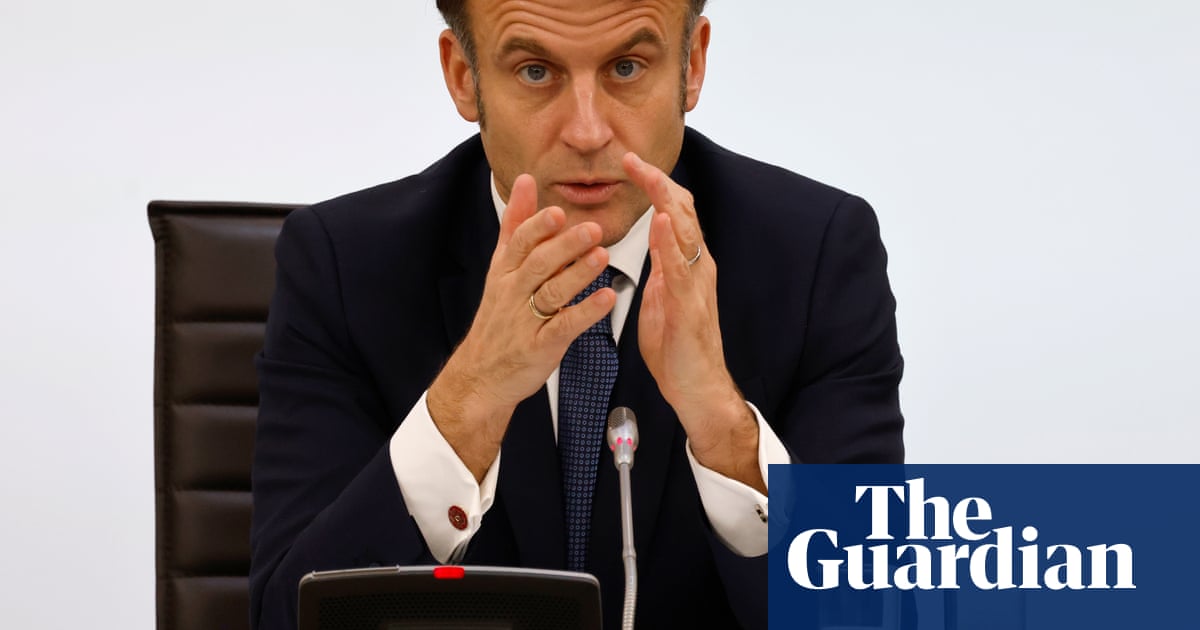A planned conference in Saudi Arabia this month that supporters of Palestine had hoped would push western governments to recognise a Palestinian state has weakened its ambition and will instead hope to agree on steps towards recognition, diplomats have said.
The change to the aims of the conference, due to be held between 17 and 20 June, marks a retreat from an earlier vision that it would mark a joint declaration of recognition of Palestine as a state by a large group of countries, including permanent UN security council members France and the UK.
Emmanuel Macron, the French president and a co-sponsor of the event, has declared recognition of Palestine as “a moral duty and political requirement”, but French officials briefing their Israeli counterparts this week reassured them the conference will not be the moment for recognition.
That is now seen as a prize that will emerge from other measures, including a permanent ceasefire inGaza, the release of Israeli hostages, reform of the Palestinian Authority, economic reconstruction and a definitive end to Hamas’s rule in Gaza.
France and Saudi Arabia have set up eight working parties to prepare the necessary ingredients for a two-state solution, and Macron is hosting a conference of civil society under the banner of the Paris Peace Forum immediately before the three-day conference.
The UK is overseeing the humanitarian working party and other working groups cover reconstruction, economic viability of a Palestinian state, promoting respect for international law, narratives for peace and “peace day”, an imagining of the benefits to both sides from a peaceful settlement.
Israel and the US have attended run-up meetings to the conference but have not spoken, prompting speculation they may boycott the event.
Israel has fought hard to prevent stateless Palestinians achieving self-determination. Polls show only a fifth of the Israel electorate favour a two-state solution and 56% of Jewish Israelis supported the “transfer of Arab citizens of Israel to other countries”.
Israel has also approved plans to build a further 22 settlements in the West Bank–the biggest expansion in decades. Israel’s defence minister, Israel Katz, said it was “a strategic move that prevents the establishment of a Palestinian state”.
Macron’s initiative has been described as “disastrous” by the Israel’s ambassador to France, Joshua Zarka.
Recognition of a Palestinian state was previously seen as an outcome of a failed 1990s-era two-state plan. However, governments in Europe increasingly doubt Israel has any intention to ease its control over Palestinians and see recognition as a possible lever to force a change of thinking among Israeli officials.
Ireland, Spain and Norway recognised a Palestinian statelast year. Macron has insisted he would only recognise a Palestinian state without Hamas–the same stance as the UK.
Inan open letterto Macron, The Elders, a group of former senior UN diplomats, say recognition is “an essential transformative step towards peace” that should be taken as a matter of principle, divorced from negotiations over the ultimate form of Palestinian statehood and how and when Hamas should be disarmed.
Anne-Claire Legendre, the president’s adviser on the Middle East, has said the conference “must mark a transformative milestone for the effective implementation of the two-state solution. We must move from words to deeds, and we must move from the end of the war in Gaza to the end of the conflict.”
She met Israeli officials this week to discuss the conference and Israel’s often cloudy long-term vision for the region. She also met the Palestinian prime minister, Mohammad Mustafa. Israeli newspapers reported the travelling French officials as saying: “The recognition of a Palestinian state remains on the table, but not as a product of the conference. This will remain a bilateral subject between states.”
The British foreign secretary, David Lammy, who is expected to attend the conference, is under massive backbench pressure to do more to punish Israel and is, at minimum, being asked flesh out the conditions for the UK recognition of a Palestinian state.
Hamish Falconer, the Middle East minister, told MPs this week the UK thinking was evolving. “One reason that the traditional position of the UK government has been that the recognition of a Palestinian state should come at the end, or during, a two-state solution process was the hope that we would move towards a two-state solution,” he said. “Many minds have been changed because of the rhetoric of the Israeli government – the clear statements by so many that they are no longer committed to a two-state solution.”
But the British are looking for firm undertakings at the conference on the future government of Palestine, including the exclusion of Hamas from any future governance of Gaza, which is something Hamas itself has appeared to accept in the various plans drawn up by Arab states.
A growing number of Conservative MPs have broken with their frontbench on the issue and now back recognition, including the former attorney general Sir Jeremy Wright.
France hopes that a group of western states recognising a Palestinian state could be counter-balanced by Muslim states normalising relations with Israel.
However, Saudi recognition of Israel seems impossible. The Saudi crown prince, Mohammed bin Salman, the other co-host, has asserted repeatedly that Israel is committing a genocide, a view that is shared widely by Saudi public opinion.
